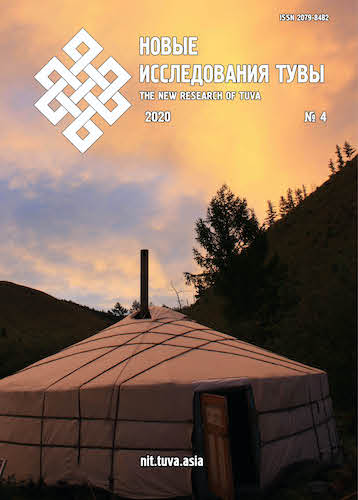Tuvan Buddhist pilgrimage: from tradition to the faith
DOI:
https://doi.org/10.25178/nit.2020.4.10Keywords:
Tuva; Buddhism; Tuvan Buddhism; Tuvans; religiousness; pilgrimage; religious tourism; Dalai Lama; India; Nepal; Tibet; Mongolia; LatviaAbstract
The article examines the contemporary Buddhist pilgrimage in Tuva as a social practice and movement. For its sources, it relies on semi-formal interviews, recorded in February and March 2020 in Kyzyl, with 11 Tuvans who accompanied religious pilgrims, or themselves participated in foreign pilgrimage tours.
The first pilgrimage Tuvans undertook in post-Soviet period occurred in 1995, and its destination was India, which is now the center of Tibetan Buddhism and the country of residence of its leader. The first students of Buddhism went there in 1997. Pilgrimage tours were subsequently organized in the early 2000s by Tuvan lamas and first pilgrims who had returned from India earlier. This social movement was developing spontaneously, with pilgrims going abroad separately or in groups, as a centralized structure did not exist at the time.
There are three types of destinations popular among pilgrims: foreign locations (residence of His Holiness the Dalai Lama XIV in Dharamsala, India, holy places associated with the life of Shakyamuni Buddha; Nepal, Tibet, Mongolia; Western countries where the Dalai Lama lectures on his teachings), Russian locations (Buryatia, Kalmykia and Saint Petersburg, where Buddhist temples and centers are located), and locations in Tuva proper.
The experience of lay pilgrimage in the form of religious tourism allows them to develop an interest in Buddhism to a degree which helps start the internal transition from a “traditional Buddhist” to a “devout Buddhist”.
References
Abaev, N. V., Khomushku, O. M. and Bicheldey, U. P. (2013) Buddizm v Tsentral'noi Azii: istoriia, osnovy ucheniia i kul'tura [Buddhism in Central Asia: history, basic teachings, and culture]: a textbook. Kyzyl, TuvGU. 131 p. (In Russ.).
Badmaev, V. N., Ulanov, M. S., Lamazhaa, Ch. K., Bicheldey, U. P., Antonov, V. I. And Ochirova, O. A. (2020) Rossiia i buddiiskii mir glazami molodezhi Tuvy, Buriatii i Kalmykii (po materialam sotsiologicheskogo oprosa) [Russia and the Buddhist world through the eyes of the youth in Tuva, Buryatia and Kalmykia: a sociological survey and its outcomes]. New Research of Tuva, no. 1, pp. 35–49. (In Russ.). DOI: https://doi.org/10.25178/nit.2020.1.3
Berger, P. (2019) Sviashchennaia zavesa. Elementy sotsiologicheskoi teorii religii [The Sacred Canopy: Elements of a Sociological Theory of Religion]: transl. from Engl. by R. Safronova. Moscow, Novoe literaturnoe obozrenie. 208 p. (In Russ.).
Buddizm [Buddhism] (1992): A dictionary / Abaeva L. L., Androsov V. P., Bakaeva E. P. et al., ed. by N. L. Zhukovskaya, A. N. Ignatovich and V. I. Kornev. Moscow, Respublika. 288 p. (In Russ.).
Vatorpin, A. S., Kostina N. B. and Podergina, E. E. (2017) Transformatsiia fenomena palomnichestva v sovremennom obshchestve [Pilgrimage phenomenon’s transformation in the modern society]. Discussion, no. 7, pp. 54–62. (In Russ.).
Giddens, A. (1999) Sotsiologiia [Sociology]. Transl. from Engl. Moscow, Editorial URSS. 704 p. (In Russ.).
Guchinova, E.-B. M. (2020a) Palomnichestvo kak put' k vere: opyt sotsial'nogo konstruirovaniia religioznosti [Pilgrimage as a Path to Faith: an Essay on a Social Construction of Religiosity]. Gosudarstvo, religiia, tserkov' v Rossii i za rubezhom, no. 1 (38), pp. 152–176. (In Russ.).
DOI: https://doi.org/10.22394/2073-7203-2020-38-1-152-176
Guchinova, E.-B. M. (2020b) S krasnoi kist'iu i zheltym galstukom: o spetsifike kalmytskogo palomnichestva [With a Red Brush and Yellow Tie: On Specificities of the Kalmyk Pilgrimage]. Etnograficheskoe obozrenie, no. 2, pp. 32–46. (In Russ.). DOI: https://doi.org/10.31857/S086954150009603-3
Dalai-lama (2015) Vspyshka molnii vo mrake nochi. Kratkii kommentarii k «Bodkhichar'ia-avatare» Shantidevy [A flash of lightning in the dark of the night. A brief commentary on Shantideva's Bodhicharya avatar] : Transl. from Engl. and ed. by Yu. Zhironkina, ed. by B. Zagumennov. Moscow, Fond «Sokhranim Tibet». 176 p. (In Russ.).
Darieva, Ts. A., Guchinova E.-B. M. (2020) Issleduia sovremennoe palomnichestvo u mongoloiazychnykh narodov Rossii [Exploring Contemporary Pilgrimage among the MongolianSpeaking Peoples of Russia]. Etnograficheskoe obozrenie, no. 2, pp. 5–12. (In Russ.). DOI: https://doi.org/10.31857/S086954150009601-1
Erokhina, M. V. (2019) Buddiiskoe palomnichestvo v Indii: istoriia i sovremennost' [Buddhist pilgrimage in India: history and modernity]. Asiatica: Trudy po filosofii i kul'turam Vostoka, vol. 13, no. 2, pp. 122–140.
Zhitenev, S. Yu. (2010) Religioznoe palomnichestvo : mezhkul'turnye kommunikatsii i tsivilizatsionnyi kontekst [Religious pilgrimage : cross-cultural communications and civilizational context] : Thesis of Diss. … Candidate of Cultural Studies. Moscow. 26 p. (In Russ.).
Zhitenev, S. Yu. (2012) Religioznoe palomnichestvo v khristianstve, buddizme i musul'manstve: sotsiokul'turnye, kommunikatsionnye i tsivilizatsionnye aspekty [Religious pilgrimage in Christianity, Buddhism, and Islam: sociocultural, communication, and civilizational aspects]. Moscow, Indrik. 186 p. (In Russ.).
Zhukovskaia, N. L. (1992) Lamaizm v Tuve [Lamaism in Tuva]. In: Buddizm [Buddhism] : A dictionary / Abaeva L. L., Androsov V. P., Bakaeva E. P. et al., ed. by N. L. Zhukovskaya, A. N. Ignatovich and V. I. Kornev. Moscow, Respublika. 288 p. Pp. 167–168. (In Russ.).
Zhukovskaia, N. L. (2013) O buddizme i buddistakh. Stat'i raznykh let. 1969–2011 [Of Buddhism and Buddhists. Articles of different years 1969–2011]. Moscow, Orientaliia. 240 p. (In Russ.).
Istoriia buddizma v SSSR i Rossiiskoi Federatsii v 1985–1999 gg. [The history of Buddhism in the USSR and the Russian Federation in 1985–1990] (2010) / ed. by. N. G. Ochirova. Moscow, Fond sovremennoi istorii. 392 p. (In Russ.).
Kaluzhnikova, E. A. (2007) Palomnichestvo kak ritual : sushchnost' i kul'turno-istoricheskie tipy [Pilgrimage as a ritual: its essence and cultural and historical types]: Thesis of Diss. … Candidate of Cultural Studies. Ekaterinburg. 23 p. (In Russ.).
Kormina, J. V. (2019) Palomniki. Etnograficheskie ocherki pravoslavnogo nomadizma [Pilgrims: Ethnographic Sketches of the Orthodox Nomadism]. Moscow, HSE Publishing House. 351 p. (In Russ.). DOI: doi.org/10.17323/978-5-7598-1939-4
Lamazhaa, Ch. K. (2019) Geokul'turnye obrazy buddiiskogo mira tuvintsev: istoricheskii kontekst i sovremennost' [Geocultural images of the Tuvan Buddhist world: historical context and modernity.]. New Research of Tuva, no. 3, pp. 27–40. DOI: https://doi.org/10.25178/nit.2019.3.3
MacCannell, D. (2016) Turist. Novaia teoriia prazdnogo klassa [The tourist: a new theory of the leisure class] / transl. by A. Borovikov and E. Izotov. Moscow, Ad Marginem Press. 279 p. (In Russ.).
Mongush, M. V. (1992) Lamaizm v Tuve : istoriko-etnograficheskoe issledovanie [Lamaism in Tuva: a historical and ethnographic study]. Kyzyl, Tuvan book publisher. 144 p. (In Russ.).
Mongush, M. V. (2001) Istoriya buddizma v Tuve (vtoraya polovina VI — konets XX v.) [The History of Buddhism in Tuva (latter half of the 6th — late 20th cc.)]. Novosibirsk, Nauka. 200 p. (In Russ.).
Mongush, M. V. (2010) Indiiskaia mozaika (chast' pervaia) [The Indian mosaic (Part one)]. New Research of Tuva, no. 1, pp. 311–331 [online] Available at: https://nit.tuva.asia/nit/article/view/585 (access date: 03.08.2020). (In Russ.).
Munkhbat, D. (2018) Palomnichestvo mongolov: traditsii i sovremennost' [Mongols on pilgrimage: traditions and the present]. Nations and religions of the Eurasia, vol. 2, no. 15, pp. 79–84. (In Russ.). DOI: https://doi.org/10.14258/nreur(2018)2-07
Mchedlova, M. M. (2017) Religioznaia i konfessional'naia identichnost' [Religious and confessional identity]. In: Identichnost': Lichnost'. Obshchestvo. Politika. Entsiklopedicheskoe izdanie [Identity: Personality. Society. Politics. An encyclopedia] / ed. by I. S. Semenenko. Moscow, Ves' Mir. 992 p. Pp. 334–339. (In Russ.).
Pavlichenko, Z. Yu. (2015) Palomnichestvo v kiberprostranstve [Pilgrimage in the cyberspace]. Vestnik KRSU, vol. 15, no. 12, pp. 106–109. (In Russ.).
Pavlichenko, Z. Yu. and Davydenko, M. V. (2018) Palomnichestvo i religioznyi turizm v Tsentral'noi Azii kak forma mezhtsivilizatsionnykh kontaktov [Pilgrimage and Religious Tourism in Central Asia as a Form of Intercivilization Contacts]. Izvestiya of Altai State University, no. 2, pp. 136–139. (In Russ.). DOI: https://doi.org/10.14258/izvasu(2018)2-23
Palomnichestvo i religioznyi turizm: mnogoobrazie interpretatsiia [Pilgrimage and religious tourism: a multitude of interpretations] (2011) : collected papers / ed. by I. E. Vikulov et al. Vladimir, Izd-vo Vladimirskogo gos. un-ta im. A. G. i N. G. Stoletovykh. 209 p. (In Russ.).
Sodnompilova, M. M., Amangolova, D. D. (2020) Traditsionnye i novye mesta religioznogo palomnichestva v Buriatii [Traditional and New Places of Religious Pilgrimage in Buryatia]. Etnograficheskoe obozrenie, no. 2, pp. 47–60. (In Russ.). DOI: https://doi.org/10.31857/S086954150009604-4
Tenzin Gyatso (Dalai Lama XIV) (2000) Moia strana i moi narod. Vospominaniia Ego Sviateishestva Dalai-lamy XIV [My Land and My People: The Original Autobiography of His Holiness the Dalai Lama of Tibet] / transl. by A. Terent'ev. St. Petersburg, Nartang, Corvus. 320 p. (In Russ.).
Uzlaner, D. (2020) Postsekuliarnyi povorot. Kak myslit' o religii v XXI veke [Post-secular turn. How to think about religion in the 21st century]. Moscow, Institut ekonomicheskoi politiki imeni E. T. Gaidara. 187 p.
Ulanov, M. S., Badmaev V. N., Andreeva A. A. (2020) Fenomen buddiiskogo palomnichestva v istorii i kul'ture kalmykov [The Phenomenon of Buddhist Pilgrimage in the History and Culture of Kalmyks]. Bylye Gody, vol. 56, issue 2, pp. 398–406. (In Russ.). DOI: https://doi.org/10.13187/bg.2020.2.398
Fenomen palomnichestva v religiiakh: sviashchennaia tsel', sviashchennyi put', sviashchennye relikvii [The phenomenon of pilgrimage in different religions: sacred goals, sacred paths, sacred relics] (2006): Materials of the 13th St. Petersburg religious studies readings / ed. and comp. by T. N. Dmitriev and I. Kh. Cherniak. St. Petersburg, Gos. muzei istorii religii. 147 p. (In Russ.).
Khomushku, O. M. (1998) Religiia v istorii kul'tury tuvintsev [Religion in the history of Tuvan culture]. Moscow, Institut etnologii i antropologii RAN. 177 p. (In Russ.).
Khomushku, O. M. (2005) Religiia v kul'ture narodov Saiano-Altaia [Religion in the culture of the Sayano-Altai peoples]. Moscow, RAGS. 225 p. (In Russ.).
Khomushku, O. M. and Kukhta, M. S. (2016) Etnokonfessional'nyi faktor v dukhovnom vozrozhdenii Tuvy: sotsial'no-filosofskii analiz [The Ethno-Confessional Factor in the Spiritual Revival of Tuva: a Social and Philosophical Analysis]. Oriental Studies, no. 27(5), pp. 119–126. (In Russ.).
Tsyrempilov, N. V. (2020) Moskva kak buddiiskii rai: buriatskaia deputatsiia na koronatsii Nikolaia II [Moscow as a Buddhist Paradise: A Buryat Delegation at the Coronation of Nicholas II]. Etnograficheskoe obozrenie, no. 2, pp. 13–31. (In Russ.). DOI: https://doi.org/10.31857/S086954150009602-2
Erendzhenova, Yu. Yu. (2020) Sviashchennye ob"ekty v religioznoi kul'ture rossiiskikh buddistov: intentsii i praksis [The holy objects in religious culture of Russian Buddhists: intentions and praxis]. Vestnik Kalmytskogo universiteta, no. 2 (46), pp. 124–130. (In Russ.).
Bremer, T. S. (2004) Blessed with tourists: The borderlands of religion and tourism in San Antonio. Chapel Hill and London: The University of North Carolina Press. 207 p.
Coleman, S. (2002) Do You Believe in Pilgrimage? Communitas, Contestation and Beyond. Anthropological Theory, vol. 2(3), pp. 355–368.
Collins-Kreiner, N. (2010) Researching pilgrimage: Continuity and Transformations. Annals of Tourism Research, vol. 37, issue 2, pp. 440–456. DOI: https://doi.org/10.1016/j.annals.2009.10.016
Joseph, C. A. and Kavoori, A. P. (2001) Mediated resistance. Tourism and the host community. Annals of Tourism Research, no. 28(4), pp. 998–1009.
Kim, B., Kim, S., King B. (2020) Religious tourism studies: evolution, progress, and future prospects. Tourism Recreation Research, vol. 45, pp. 185–203. DOI: https://doi.org/10.1080/02508281.2019.1664084
McIntosh, I. S. (2020) Pilgrimage: Walking to Peace, Walking for Change. Xlibris Corporation. 250 p.
Mustonen, P. (2006) Volunteer Tourism: Postmodern Pilgrimage? Journal of Tourism and Cultural Change, vol. 3, issue 3, pp. 160–177. DOI: https://doi.org/10.1080/14766820608668493
Shrines and pilgrimage in the modern world: New itineraries into the sacred (2008) / Ed. by P. J. Margry. Amsterdam University Press. 364 p.
Shinde, K. (2007) Pilgrimage and the Environment: Challenges in a Pilgrimage Centre. Current Issues in Tourism, vol. 10, issue 4, pp. 343–365. DOI: https://doi.org/10.2167/cit259.0
Raj, R., Griffin, K. (ed.) (2015) Religious Tourism and Pilgrimage Management. An International Perspective. 2nd ed. DOI: https://doi.org/10.1079/9781780645230.0000
Reframing pilgrimage : cultures in motion (2004) / ed. by S. Coleman and J. Eade. London; New York, Routledge. 197 p.
Sellner, E. C. (2004) Pilgrimage: Exploring A Great Spiritual Practice. Ave Maria Press. 220 p.
Turner, V. and Turner, E. (1978) Image and Pilgrimage in Christian Culture. Columbia University Press. 344 p.
Wong, C. U. I., Mcintosh, A. and Ryan, C. (2013) Buddhism and tourism perceptions of the monastic community at Pu-Tuo-Shan, China. Annals of Tourism Research, vol. 40, pp. 213–234. DOI: http://dx.doi.org/10.1016/j.annals.2012.09.004
Published
How to Cite
Ламажаа Ч. К., Бичелдей У. П., Монгуш А. В. Тувинское буддийское паломничество: от традиции к вере // Новые исследования Тувы. 2020, № 4. С. 135‑155. DOI: www.doi.org/10.25178/nit.2020.4.10
For citation:
Lamazhaa Ch. K., Bicheldey U. P. and Mongush A. V. Tuvinskoe buddiiskoe palomnichestvo: ot traditsii k vere [Tuvan Buddhist pilgrimage: from tradition to the faith]. New Research of Tuva, 2020, no. 4, pp. 135-155. (In Russ.). DOI: www.doi.org/10.25178/nit.2020.4.10
Issue
Section

This work is licensed under a Creative Commons Attribution-NonCommercial 4.0 International License.

Author(s) license holder(s) grant rights for their work to the journal (grantee of a license) under the simple non-exclusive open license in accordance with Art. 1286.1 «Open license for a research work, work of literature or fine arts», Civil Code of the Russian Federation.
New Research of Tuva publishes articles under the Creative Commons Attribution-NonCommercial license (CC BY-NC).
Since it is an open license, author(s) reserve the right to upload the article to their institutional repository, submit it to another journal (if it allows republications), or republish it on their own website (in full, or in part).
However, several conditions apply here:
a) The republished version must always contain the name(s) and affiliation(s) of the author(s), the original title and the hyperlink to the original version on the New Research of Tuva website;
b) It must be in open access, free of charge, and no category of readers must be in any way whatsoever advantaged over general readership.
c) should the contribution be submitted elsewhere by its author(s) without substantial modification (30% or more of original text unchanged), the body of the article should contain a disclaimer that the original version was published in New Research of Tuva (with a link to the respective page)
The CC-BY-NC is a non-revocable license which applies worldwide and lasts for the duration of the work’s copyright.











